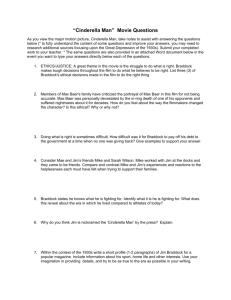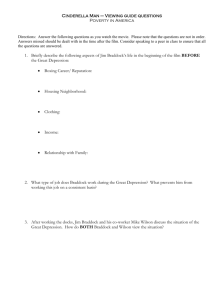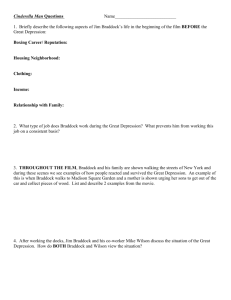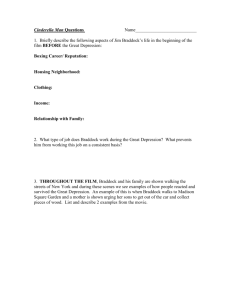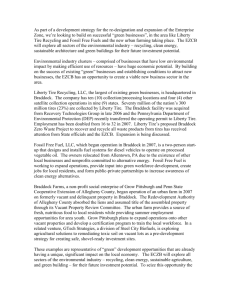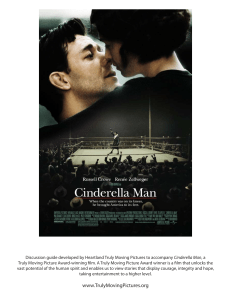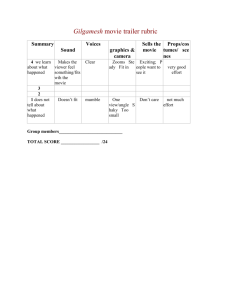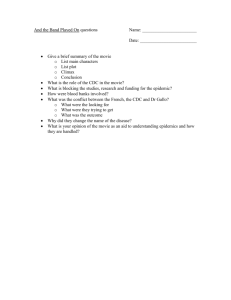CINDERELLA MAN Film Synopsis Discussion Guide
advertisement
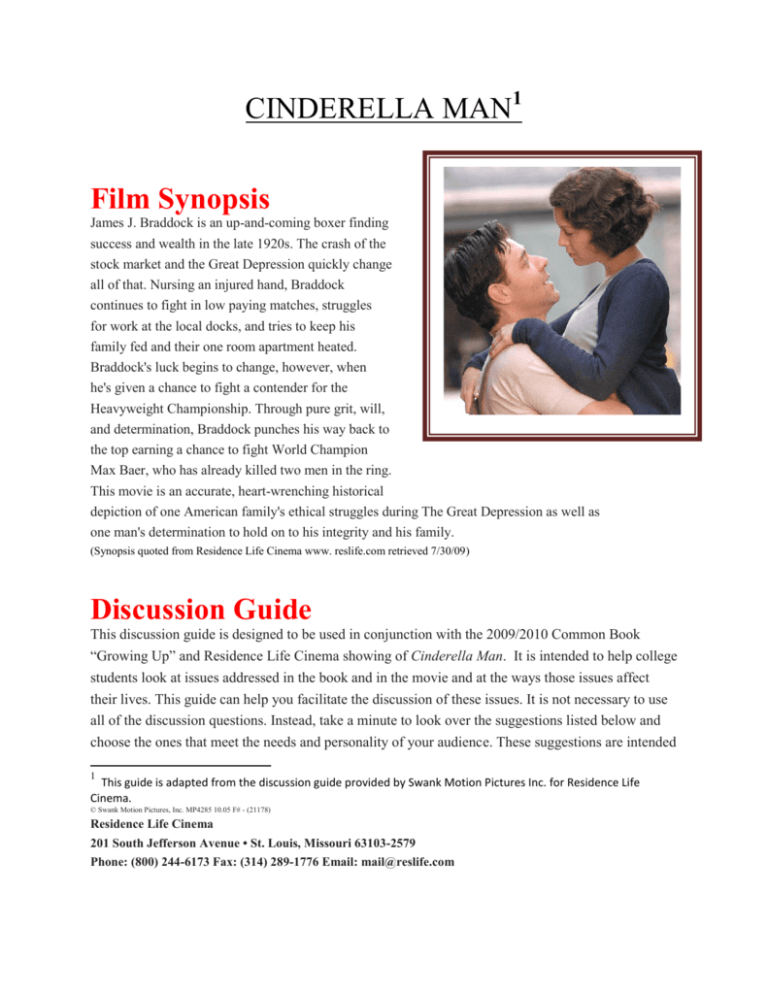
CINDERELLA MAN1 Film Synopsis James J. Braddock is an up-and-coming boxer finding success and wealth in the late 1920s. The crash of the stock market and the Great Depression quickly change all of that. Nursing an injured hand, Braddock continues to fight in low paying matches, struggles for work at the local docks, and tries to keep his family fed and their one room apartment heated. Braddock's luck begins to change, however, when he's given a chance to fight a contender for the Heavyweight Championship. Through pure grit, will, and determination, Braddock punches his way back to the top earning a chance to fight World Champion Max Baer, who has already killed two men in the ring. This movie is an accurate, heart-wrenching historical depiction of one American family's ethical struggles during The Great Depression as well as one man's determination to hold on to his integrity and his family. (Synopsis quoted from Residence Life Cinema www. reslife.com retrieved 7/30/09) Discussion Guide This discussion guide is designed to be used in conjunction with the 2009/2010 Common Book “Growing Up” and Residence Life Cinema showing of Cinderella Man. It is intended to help college students look at issues addressed in the book and in the movie and at the ways those issues affect their lives. This guide can help you facilitate the discussion of these issues. It is not necessary to use all of the discussion questions. Instead, take a minute to look over the suggestions listed below and choose the ones that meet the needs and personality of your audience. These suggestions are intended 1 This guide is adapted from the discussion guide provided by Swank Motion Pictures Inc. for Residence Life Cinema. © Swank Motion Pictures, Inc. MP4285 10.05 F# - (21178) Residence Life Cinema 201 South Jefferson Avenue • St. Louis, Missouri 63103-2579 Phone: (800) 244-6173 Fax: (314) 289-1776 Email: mail@reslife.com to assist you, not to limit you. Feel free to modify or elaborate them to suit your needs. Most important, make an effort to see the movie and consider the questions in advance so that you do not approach the program “cold”. The movies are available accessible on campus on Cable Channel 20 and are also available for rent at Blockbuster.com and Netflix.com. The discussion facilitator may choose to utilize one of the following activities as a means of developing discussion: Programming Suggestions 1. ETHICS/JUSTICE: A great theme in the movie is the struggle to do what is right. Braddock teaches his son to make the correct decision about stealing. Braddock also makes a tough decision when he repays the government aid. Talk about Braddock's ethical decisions and pass out a list of ethical questions for discussion. Examples: a. You find a wallet with an $8 million winning lottery ticket in it. b. Your neighbor offers to let you hook into his cable. c. When waiting for a Professor in his/her office, you see the upcoming test answers. 2. FAMILY: After the film, have the students talk about family structures today and how they may differ from the family depicted in the movie. Many students deal with family issues and find it difficult to go home at breaks, deciding which parent to spend time with, and how to deal with the stresses of a family. You could bring in a counselor and have them talk about the roles of the family and dealing with family stress. 3. PERSONAL ACHIEVEMENT: James J. Braddock displayed a great deal of determination on his journey to personal achievement. Do students today have that same drive and why or why not? Equate Braddock's determination and willingness to succeed with what it takes to graduate from college. Talk to freshmen students about staying the course, suffering through the difficult times, working hard to achieve goals, and maintaining a positive attitude throughout their college careers. You could have older students do little skits about the difficulties of college life that mimic the things Braddock went through, capping it off with role-playing graduation and the thrill of that victory! 4. HISTORICAL EVENTS: While we are in a recession, this generation of students has not experienced major historical events like the great depression. Watch this movie and then have a discussion about the impact this time had on our nation's history, their great grandparents, and how our government deals with things today. Bring in a history professor to discuss this time in history. Have the RA's create a bulletin board depicting the suffering and poverty during the great depression, and publicizing the movie and program. Facilitating the Program The facilitator should always remain somewhat neutral in the discussion. This does not mean that the role of “devil’s advocate” should not be utilized. It may be necessary for the facilitator to voice opposite opinions to continue the discussion and insure different viewpoints are examined. Hopefully, this will enable student to participate by examining opinions and learning to defend and question all viewpoints equally. Movie Discussion Questions 1. What did you think of the movie? Did you like it? 2. What struggles did James J. Braddock face throughout the movie? Did you like James Braddock? Why or why not? 3. What issues do people today deal with that are similar to those of the Braddock family? How are today's issues different? What sorts of new issues will our children face? 4. The Great Depression affected everyone to some degree. How were the people in the movie affected? How were the different socio-economic classes affected? 5. Doing what is right is sometimes difficult. How difficult was it for Braddock to pay off his debt to the government at a time when no one was giving back? 6. The scene where Braddock's son explains why he stole is extremely powerful. Would you steal if your family hadn't eaten in a week, or if your family's ability to stay together depended on it? How do you feel about the ethics of this decision? 7. Braddock states that he knows what he is fighting for: milk. How does that make you feel about what you have today? Should we be ashamed for having Xboxes, big screen TVs, cell phones, and the latest digital cameras? Although Braddock was fighting for milk, he knew that winning also meant fame and money. Do you think that he wanted this fame? Why or why not? 8. Many times it today's society is critiqued for being lazy. Is it? Why or why not? Could you have shown the same determination that Braddock did to succeed? Explain. 9. How has this movie changed the way you view the struggles your grandparents and great grandparents went through? 10. Members of Max Baer's family have criticized the portrayal of Max Baer in this film for not being accurate. Max Baer was personally devastated by the in-ring death of one of his opponents and suffered nightmares about it for decades. How do you feel about the way the filmmakers changed the character? Is this ethical? Why or why not? Common Book Connections 1. Both the movie and the book depicted a reality that many families suffered during the Great Depression, having to send away one’s children because the parents could not afford to take care of them. After the Great Depression, to keep people above these drastic levels of poverty, the U.S. government instituted social safety nets such as TANF. Research TANF in S.C. and critically assess it. What is its goal? What are the benefits and limitations of the program? Could it be improved in any way? What do you think of this type of emergency support for families? If we called it welfare, would that change your view on the program? 2. Both the film and the movie had some characters that were poor and others that were “rich”. What did the rich and the poor have in common during this era? How were their lives different? How do you think the recession of today is affecting different social classes? 3. The book and the movie shared the theme of a personal journey of achievement. What role does attitude play in “making something of yourself”? What personality traits would you say that Jim Braddock and Baker’s mother share? What traits do they attempt to instill in their children? 4. Apart from individual traits, what role does historical circumstances and institutional structures play in enabling or hampering a person’s efforts to make something of him or herself? How do the characters in the book and film overcome economic and structural obstacles? 5. How did the families in the book and the film know they had “made it”? Do you define success in the same way or differently? How is your view of success influenced by the society, culture, and time period you live in or by your family background? Connection to the Core Commitments These films were chosen because they all examine the dual themes of growing up and striving for excellence from a different perspective. Cinderella Man compares directly with the book in showing the experiences of a white family struggling to make it during the Great Depression. In contrast, The Color Purple shows us how life was different during that same time period for women and African Americans. Of Mice and Men tells the story of two men, one with a disability, in the Deep South during the Great Depression, and Avalon tells the story of a family of Jewish immigrants in Baltimore during the same time period. Lastly, Into the Wild, is set in the present day, but shows a very different perspective on growing up in which a teenager from a relatively privileged background relinquishes all material possessions and tries to reconnect with nature in order to “make something of himself”. Taking Seriously the Perspective of Others These films encourage students to contrast the varied perspectives of males and females, members of racial minorities and dominant groups, able-bodied persons and persons with disabilities, along with the poor and the privileged. Discussing themes of disability, class privilege, racial and ethnic relations, poverty and oppression encourages students to consider how one’s position in the social hierarchy might influence the lives of individuals. Striving for Excellence Russel Baker’s mother was always pushing him to “make something of himself”. What does it mean to make something of oneself? Though the characters in the book and films might answer that question differently, each is striving for a better, more fulfilling life. Each of these films depicts a struggle in which characters face various obstacles and emerge as stronger, more determined individuals. While their goals are different, each takes the high road and makes the most out of his or her circumstances. These five films encourage students to strive for excellence despite tough economic times, racism, sexism, or physical barriers they may encounter along the way. Refining Ethical and Moral Reasoning This program invites students to compare the ideas institutions, philosophies, moral codes, and ethical principles of the past to those they have experienced in the present day. This program creates an atmosphere in which students can reflect on their own values, attitudes, beliefs, and habits while comparing them to the characters in the book and films.
